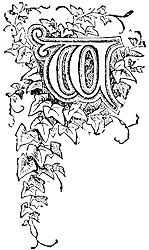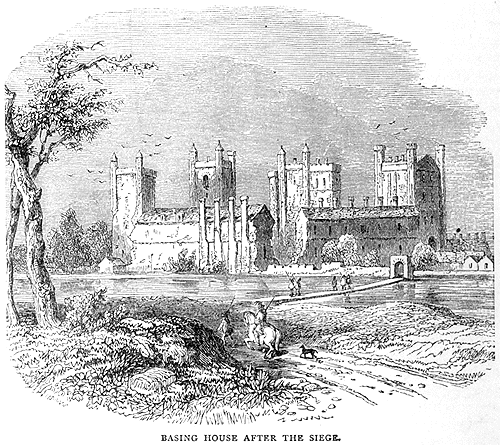 |

E cannot leave the grave of the loyal Marquis without adding a few words about that glorious defence of his house that has won a record in our history.
Basing House was one of those grand old mansions that were built with capacities for defence in troubled times, and in 1644 it was garrisoned for the king by the Marquis of Winchester. For three months it had been straitly besieged by the Parliamentary troops of Hampshire and Sussex Under the command of Norton, a man of spirit and fortune. It was so closely begirt before the king's march to the West, and was looked upon as a place of such importance, that when the king sent notice to Oxford of his projected march into the West the council besought Charles to relieve Basing on his way. But the king, thinking that it would retard his march, declined to do so.
Norton now summoned the Marquis to surrender, but the gallant old noble answered: "if the king had no more ground in England than Basing House he would maintain it to the uttermost." Yet at the moment he had sent frequent expresses to the council begging them to provide in some manner for his relief, and not to suffer his person and a place from which the rebels received so much prejudice to fall into their hands. The Marquis had indeed great claims on them, for Wailer had besieged Basing House previously, and been driven off; and Lady Winchester was at Oxford, urging the council to preserve her husband.
But famine now threatened to do that which the sword could not; the garrison suffered the extremity of want. So great was it that in September, 1644, the Marquis, after sending messenger after messenger to Charles, who was then at Oxford, despatched to him at last, notice that if no assistance came in ten days, he must surrender. The brave Colonel Gage then volunteered to convey them provisions. With great skill and some hard fighting he succeeded in his endeavour, and returned to Oxford successful; but having had eleven men killed and forty or fifty wounded.
 This extraordinary defence of Basing House naturally drew the eyes of the nation to it, and the humiliated and angry parliament turned at last to Cromwell, and ordered him to undertake the siege. He marched thither with three regiments of foot and three of horse; double the number of the defenders, and was at last successful. In his letter to the Speaker of the House of Commons, October 14th, 1645, he says:- "SIR, - I thank God I can give you a good account of Basing. After our batteries placed, we settled the several posts for a storm. Col. Dalbeere was to be on the north side of the house, next the Grange; Col. Pickering on his left hand, and Sir Hardress Waller's and Col. Montague's regiments next him. We stormed this morning after six of the clock; the signal for falling on was the firing from our cannon, which being done our men fell on with great resolution and cheerfulness. We took the two houses without any considerable loss to ourselves. Colonel Pickering stormed the new house, passed through and got to the gate of the old house, where. upon they summoned a parley, which we would not hear. In the meantime Col. Montague's and Sir Hardress Waller's regiments assaulted the strongest work, where the enemy kept his court of guard, which with great resolution they recovered, beating the enemy from a whole culverin and from that work, which having done they drew their ladders after them, got over another work and the house wall before they could enter. In this Sir Hardress Waller, performing his duty with honour and diligence, was shot in the arm, but not dangerously. We have had little loss; many of the enemies our men put to the sword and some officers of quality; most of the rest we have prisoners, amongst which are the Marquis and Sir Robert Peake, with divers others officers whom I have ordered to be sent up to you. We have taken ten pieces of ordnance, much ammunition, and our soldiers a good encouragement."
This good encouragement was valued at £200,000, in money, jewels, provisions, and magnificent furniture. Nothing could be more shameful and savage than the conduct of the Roundhead soldiers in this affair. The loyal and unfortunate marquis would have been murdered had not Colonel Hammond, who had been for a week the prisoner of the noble Winchester, in gratitude for the generous treatment he had received, saved Lord Winchester's life at the imminent hazard of his own. Nothing can be more true or pathetic than Charles Landseer's picture of this event. Two hundred royalists were taken prisoners, one hundred were slain. Of the latter there were counted in the house, immediately after the assault, seventy-four men and one young lady. She was the daughter of a clergyman, Dr. Griffiths.
"She came," says Mr. Peters, Cromwell's messenger to the Commons, "railing against our soldiers for their rough carriage towards her father," whom even Peters acknowledges they used "hardly," i.e. "cruelly," on account of his being a clergyman; and when the daughter interfered to save her tortured parent, the wretched Roundheads killed her. "Her two sisters and six or seven other ladies of rank were permitted to escape without serious injury."
When the soldiers were withdrawn, a fire, caused by an unquenched fireball thrown by the besiegers, broke out, and in twenty hours only bare walls and chimneys remained of Basing House. The Parliament ordered it to be utterly destroyed. The Basingstoke Canal now runs through its site.
The Marquis of Winchester lived to see the Revolution of Charles II., but his heroic loyalty met with no reward or requital from his royal master.
|
 |